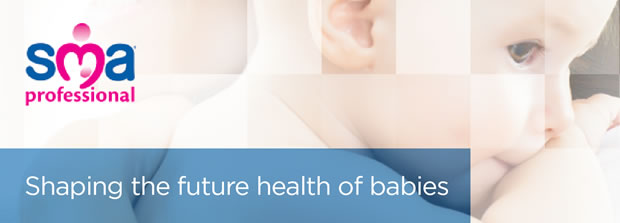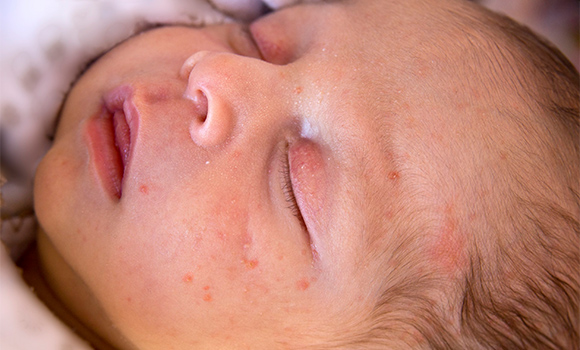| Shaping the future health of babies |
| To ensure future mailings from SMA® Professional reach your mailbox, add smaprofessional@smaprofessional.msgfocus.com to your safe sender list. |
| Email not displaying properly? Click here to view in browser |
 |
| |
| |
Dear Healthcare Professional,
Welcome to the April edition of our eNewsletter, aimed to keep you updated with the latest news in infant nutrition..
With Allergy Awareness Week running this month from 23rd - 29th April, we will be dedicating this month’s eNewsletter to all things allergy, with a focus on the role of breastfeeding in allergy prevention, and introducing the new Smiles Back app for Cows’ Milk Allergy.
Kind regards,
The SMA® Professional Team |
| |
 |
| |
|
|
 Allergy Awareness Week 2018 Allergy Awareness Week 2018 |
| |
The UK has some of the highest prevalence rates of allergic conditions in the world, with over 20% of the population affected by one or more allergic disorder1, and incidence of allergy continues to rise steadily2. The first sign of allergy is often eczema. The risk of conditions such as eczema in infants increases if family members have a history of allergy.
Even if one member has asthma or hayfever, there is a 20-40% chance of a baby developing an allergy. If both parents — or one parent and a sibling — have allergies, that risk rises to 60-80%3. Infants with eczema have a higher risk of developing a food allergy.
Allergy Awareness Week is coordinated by Allergy UK, which is the leading national charity providing support, advice and information for those living with allergic disease. |
| |
 |
| |
 |
| |
 |
| |
 The role of breastfeeding in allergy prevention The role of breastfeeding in allergy prevention |
| |
 |
| |
Studies have indicated that breastfeeding is associated with health benefits in the infant for many immune-related conditions. Breast milk is immunologically active, containing factors such as antimicrobial substances, factors that promote immune development, anti-inflammatory components and constituents that promote priming of the infant immune system4.
Exclusive breastfeeding is recommended for all infants5 and where there is a family history of atopy, exclusive breastfeeding for the first 3 months is associated with lower incidence of childhood atopic dermatitis6,7.
To support you in your conversations with parents on breastfeeding, we have developed a range of unbranded helpsheets for breastfeeding mums, available in 7 different languages. |
| |
 |
| |
 |
| |
|
|
 Introducing the NEW SmilesBack app for Cows’ Milk Allergy (CMA)* Introducing the NEW SmilesBack app for Cows’ Milk Allergy (CMA)* |
| |
SmilesBack has been created to help families to support their doctor to shorten the journey to appropriate cows’ milk allergy (CMA) diagnosis and management.
SmilesBack is an easy-to-use app, developed with allergy experts and primary care physicians that allows parents to keep track of their baby’s symptoms and feeds, share a summary of the relevant information with their doctor, and learn more about CMA signs and symptoms, path to diagnosis and management.
*SmilesBack is not a diagnostic tool. |
| |
|
|
|
 |
| |
 |
| |
|
|
 |
| |
® Registered Trademark.
IMPORTANT NOTICE: The World Health Organisation (WHO) has recommended that pregnant women and new mothers be informed on the benefits and superiority of breastfeeding – in particular the fact that it provides the best nutrition and protection from illness for babies. Mothers should be given guidance on the preparation for, and maintenance of, lactation, with special emphasis on the importance of a well-balanced diet both during pregnancy and after delivery. Unnecessary introduction of partial bottle-feeding or other foods and drinks should be discouraged since it will have a negative effect on breastfeeding. Similarly, mothers should be warned of the difficulty of reversing a decision not to breastfeed. Before advising a mother to use an infant formula, she should be advised of the social and financial implications of her decision: for example, if a baby is exclusively bottle-fed, more than one can (400 g) per week will be needed, so the family circumstances and costs should be kept in mind. Mothers should be reminded that breast milk is not only the best, but also the most economical food for babies. If a decision to use an infant formula is taken, it is important to give instructions on correct preparation methods, emphasising that unboiled water, unsterilised bottles or incorrect dilution can all lead to illness.
References: 1. M. L. Levy, D. P. (2004). Inadequacies in UK primary care allergy services: national survey of current provisions and perceptions of need. Journal of Clinical and Experimental Allergy, 34, 518-520. 2. Howarth PH. Clin Exp Allergy 1998; 28: 2–7. 3. Bergmann RL et al. Predictability of early atopy by cord blood-IgE and parental history. Clinical and experimental allergy. 1997; 27(7):752-60. 4. Hosea Blewett, H et al. Chapter 2 - The Immunological Components of Human Milk. Adv Food Nutr Res 2008; 54: 45-80. 5. World Health Organization. Breastfeeding [Online]. WHO. Available at: http://www.who.int/topics/breastfeeding/en/. Accessed March 2018. 6. Gdalevich M, et al. Breast-feeding and the onset of atopic dermatitis in childhood: A systematic review and meta-analysis of prospective studies. J Am Acad Dermatol 2001;45: 520-527. 7. Kramer M. Breastfeeding and Allergy: The Evidence. Ann Nutr Metab 2011;59 (suppl 1):20-26. |
| |
 |
| |
|
|
To ensure future mailings from SMA® Professional reach your mailbox, add smaprofessional@smaprofessional.msgfocus.com to your safe sender list.
Contact SMA® Nutrition | Terms & conditions
This email is intended for residents of the ROI
Unsubscribe |
| |
| ZTC3010a/04/18 |
|
|
|
|
|